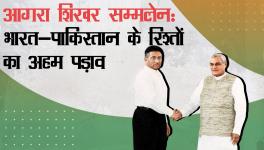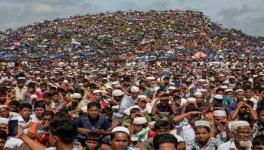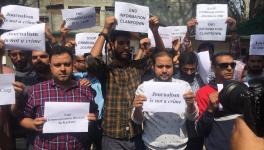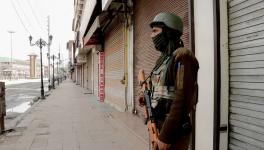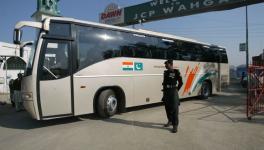Jammu-Kashmir: Where Freedom is Outlawed
Image for representational use only.Image Courtesy : The Hindu
Jammu and Kashmir (J&K) had crossed well over 100 days of lock-down and it is close to a fortnight of near-complete power cuts in the region, despite the ongoing winter chill. Yet it is apparent that Kashmir has receded from the media frenzy. News gets scarce. The tendency to blame others, pretend and pass-off setback as success, or to organise propaganda jaunts for extreme-right representatives in order to fool the Indian people into believing that India enjoys tremendous support in the world, does not bode well—for India, and even less so for Kashmiris.
Doing so denies the people—and Kashmiris in particular—their right and freedom to express themselves through speech or peaceful assembly, or to raise their concerns against what is being inflicted on them. It also means that the Bhartiya Janata Party (BJP) government, for all its strengths, is weak and has made itself vulnerable by remaining dogmatically tied to its ideological goal of changing the profile of Kashmir. As a result, when the political solution disappears, what remains is cruelty, coercion and control.
On the one hand, the Indian government refuses to acknowledge that a “Disturbed Area” is a euphemism for a war zone. On the other hand, India also claims before its judiciary that “national security” needs must prevail over people’s constitutional freedoms. As a result, neither the rules of war nor the rules of law—the two principles of civilised governance—operate in Indian-administered Kashmir (IAK).
India blames Pakistan for waging a “proxy war” against it; yet, as the United Nations’ Office of the High Commissioner for Human Rights (UNHCR) says in its 22 August press note on IAK, the information blackout in J&K is a form of “collective punishment”, and is “inconsistent with the fundamental norms of necessity and proportionality”.
In other words, if Pakistan is to be blamed for everything why punish the Kashmiris?
This apart, the detention of 13,000 to 20,000 people after 5 August, some 530 booked under the draconian Public Security Act (PSA) and the official admission that 144 children are among the detained show how widespread the crackdown is. Worse, by targeting children, India’s crackdown is beginning to resemble Israel’s apartheid policy towards the Palestinians, in which children are regarded as legitimate targets, in complete contempt of International humanitarian laws. The arrest of political activists and leaders of all hues—barring the ruling Bhartiya Janata Party—shows that even this grim a scenario is being used to push and promote the Hindutva agenda to obliterate Kashmir’s history and culture.
The government wants to showcase the low death toll as a mark of success of its policy decision to lock down Kashmir, but this has been achieved by inflicting far greater pain on Kashmiris. Denying them information and denying their right to voice their concern, cutting all sources of information and placing severe curbs on communication have created an explosive mix of economic, social and mental-health problems. Such is the extent of restrictions that even religious practices of the people are being prohibited.
Every year, tens of thousands from across Kashmir converge at the dargah Hazratbal shrine on the banks of Srinagar’s Dal Lake, to participate in the Eid-Milad-un-Nabi procession to celebrate the birthday of Prophet Muhammad. This year, the celebration was banned. The government has not allowed congregations on Friday at the historic Jamia mosque located in Nowhata Chowk in the old city of Srinagar since 5 August. Earlier in October, the government prevented thousands of people from holding special annual prayers at the Khwaja Naqshband Sahib shrine in the old city. Since this is happening at a time when Kartarpur Sahib and Ram mandir issue have been resolved makes the prohibition in Kashmir doubly poignant.
UN Human Rights Body Speaks Out
On 29 October 2019, the spokesperson of the UN High Commissioner for Human Rights, Rupert Colville, once again issued a press briefing note on IAK. Its contents are of immense importance because they validate what critics of the Indian government’s Kashmir policy have been highlighting.
Few things in the note are worth mention:
“We [The UNHCHR] are extremely concerned that the population of Indian-Administered Kashmir continues to be deprived of a wide range of human rights and we urge the Indian authorities to unlock the situation and fully restore the rights that are currently being denied.
...The undeclared curfew imposed by the authorities in the region was lifted from much of Jammu and Ladakh region within a few days, but is reportedly still in place in large parts of the Kashmir Valley, preventing the free movement of people, as well as hampering their ability to exercise their right to peaceful assembly, and restricting their rights to health, education and freedom of religion and belief.
...The Supreme Court of India has been slow to deal with petitions concerning habeas corpus, freedom of movement and media restrictions. The Jammu and Kashmir State Human Rights Commission, the State Information Commission (which implements the right-to-information laws) and the State Commission for Protection of Women and Child Rights are among key institutions being wound up, with the new bodies to replace them yet to be established.
Meanwhile, major political decisions about the future status of Jammu and Kashmir have been taken without the consent, deliberation or active and informed participation of the affected population. Their leaders are detained, their capacity to be informed has been badly restricted, and their right to freedom of expression and to political participation has been undermined.”
A Colonial Approach
While India can keep pointing fingers at Pakistan for destabilising Kashmir, fact is that every step the government of India has taken reveals an antiquated colonial attitude which, one had thought, ceased when India became independent. But when even honourable judges are willing to condone the violation of life and liberty at the altar of national security, then there is reason to begin to despair.
It is against this scenario of a virtual lockdown that the BJP-led government is introducing momentous changes which will formalise the status of Jammu and Kashmir as a colony, and its people as subjects. This is because the natives of J&K will have very little say over issues that concern them and India’s central government will exercise virtually all powers at its whim.
It is equally noteworthy that the Indian government has dropped four key land related Acts: The J&K Alienation of Land Act of 1995, the Big Landed Estates Abolition Act of 2007, the J&K Land Grants Act of 1960 and the Agrarian Reforms Act of 1976. These acts governed various aspects of land ownership-related laws and prevented the transfer of land in favour of any person who is not a permanent resident of the erstwhile state of J&K. Worth recalling is that the Indian Army joined hands with the government to distribute leaflets extoling the virtue of land prices rising and encouraging locals to sell their land. The same point was repeated by the central government in its mass advertisement campaign in the local media.
It is vital to remember the radical land reforms in J&K. The years 1948-52 were seminal, when cultivators robbed of their rights over their land under the Dogra rule after the Amritsar Treaty 1846 got their rights restored in both Jammu and Kashmir, and landless peasants became landowners. To divest the people of J&K of these rights, by luring them with talk of attractive land prices while holding a stick—in the form of lock-down and severe repression—is to provide the process of settlement a veneer of voluntariness. But the fear of losing their land and that acquiring jobs will become even more difficult, has the people in Kashmir as well as Jammu in their grips.
Even more vital is the fact that the elected government in today’s truncated J&K will have no powers over matters related to policing and public order, as provided for in the state list of the Constitution. Now on, it is the Lieutenant Governor (LG) who will exercise these powers, and he alone can promote or transfer officers of All-India Services. The LG will also have the Anti-Corruption Bureau under his control and he will have the power to appoint the principal secretary to the Chief Minister. Since all this is part of a plan/policy, it is designed to humiliate Kashmiris and side-line the people of Jammu.
Jammu suffers as Kashmir bleeds
The mutual social and economic links between Jammu and Kashmir are such that there were no way people of Jammu were going to remain unaffected by the unfolding tragedy in Kashmir. Already the industry, trade and services in Jammu are reeling because of the lock-down in Kashmir.
It is of interest to note that in Jammu, people who reportedly welcomed abrogation of Articles 370 and 35A, have been protesting too, afraid of losing their land and jobs to outsiders. They have also been lodging their discontent at being side-lined, for example by coming out on the streets to protest setting up of a new toll barrier at Saroor near Jammu city a month ago. What people resented was that the decision was taken without bothering even to take on board their concerns. Now, since 4 November, lawyers in Jammu have launched an indefinite protest against transferring responsibility for registration of immovable property (land, buildings etc) from the judiciary to a new office of Registration under the Revenue Department. That is, this responsibility has been transferred from a more transparent system to an opaque centrally-administered one.
Note that the Jammu Bar Association, whose President is also the BJP’s official spokesperson, announced this strike. The central government had dismissed the complaints lodged by its J&K state leaders against the move, forcing the lawyers to declare this indefinite strike. So, unmindful of what Kashmiris or Jammu residents feel, the BJP’s supreme leadership has decided to carry forward their plans and policy for J&K.
How far the government is willing to go to carry out its game plan is evident from the fraudulent nature of Block Development Council (BDC) selection process.
Fake Claims
Prime Minister Narendra Modi, despite suffering some humiliation in the Maharashtra and Haryana Assembly elections, had no hesitation in passing off the results as a “victory”. Going by the same standard set by him, he also declared as “historic” the so-called 98% turnout in the Block Development Council or BDC selection, which is done by an electorate made up of few thousand panchas and sarpanchas.
Unlike the 73rd and 74th amendments to the Indian Constitution, which paved the way for actual decentralisation of power with elections at every level of the Panchayati raj system, BDCs, under the Jammu and Kashmir Panchayati Raj Act of 1989, are not elected by the people but selected by the panchas and sarpanchas.
So, although 65% (12,565 out of 19,000) of the panch and sarpanch seats lie vacant in Kashmir and even the 35% who fill the posts do so without contest or with poor voter turnout, still the BJP’s strike-rate in all of J&K was pathetic. In a “contest” boycotted by all pro-India parties barring the BJP, they could corner just 81 out of 307 BDCs, with independents winning 217. In their own backyard, Jammu, the BJP managed to win just 53 out of 148 BDC posts. Hence, even in a stage-managed event which the BJP had thought would catapult its members to the BDCs and allow them to practise politics of patronage, it fared poorly.
The gradual step-up in virulent militancy post 5 August cannot be ignored. For all its tall claims of having a fool-proof three-tier security system at the international border and the Line of Control (LoC), fact is that the intelligence reports claim that 135 militants have entered J&K since that day.
Recall that the three-tier system includes “an anti-infiltration obstacle system of border fencing”, checkpoints with round-the-clock monitoring by the Army, the Border Security Forces (BSF), Village Defence Committees and even the police. Yet, the intelligence claim is that since 5 August, militants have found 25 new routes to enter J&K.
The attack on non-local labour, meanwhile, is a warning to those desiring to settle in Kashmir post-abrogation. The deliberate effort and conscious decision of the BJP government to do away with special status for J&K and turn it into an union territory where law and order, issues related to land, jobs and budgets will all be controlled by central-government bureaucrats, makes it clear that Indian government does not care a fig for democracy and democratic processes. Instead, like under the British Raj, the representatives of the people remain powerless, a mere window-dressing to camouflage what is reminiscent of a Colonial rule.
Sacrificing Liberty for Security
Therefore, the uncritical acceptance of “national security” argument cannot hide the fact that J&K has remained notified as a “disturbed” area since 1990, and where armed forces and police enjoy legal immunity. It has engendered a long history of egregious crimes against people by government forces with absolutely no concern for justice by either the agencies of state nor the judiciary. Denying any wrongdoing by the government forces has been a long-standing claim. And if nothing else works there is always Pakistan to blame, for the mess which the Indian government is primarily responsible.
Undeniably, Pakistan has been used its “assets” in shape of Jaish and Lashkar, thanks to the attitude of the Indian government, which muddied the waters in J&K. Admitedly, burden of past follies can not be wished away. But moving decisively away from politics of persuasion to opt for repression, where citizens are reduced to status of ‘subjects’ and their represantatives powerless and figureheads, is mark of regression, not progress. While the government could deny to the Indian people the truth about the cruel reality of Kashmir brought about by its own follies, with dollops of help from its media cronies, all in the name of “national interest”, these arguments will cut no ice with world opinion. With the BJP government helping the process of Kashmir’s internationalisation, many issues come into play: two nuclear armed powers, a 73-year-old dispute, China’s shift in posture on Kashmir, the endgame in Afghanistan make up the scenario. Pakistan’s role in acting as a bridge between Iran and Saudi Arabia, centrality in Afghanistan lend further weight to this. In short, because of this, the world cannot ignore developments in Kashmir, no matter what Indian government and acolytes want Indians to believe.
Therefore, the boast that India has somehow become so powerful that what the world has to say can be dismissed, may gladden Indian hearts, but in reality, will rebound on India. Such boasting has no market outside India. Ministers and officials, including army officers, have been declaring that what India does in J&K is its own “internal affair” and that the only issue is to take back Pakistan-held Kashmir.
The government then prevented Indian parliamentarians and leaders of political parties from visiting Kashmir, accusing them of whipping up protests.
Thus, making it appears that when the government speaks of J&K as an “internal affair”, it probably means that Kashmir is open for their own Hindutva kith and kin, because other Indian politicians cannot be trusted. Instead, the Indian government went out of its way to get extreme right-wing Members of European Parliament to make an all-paid-for (by the Indian government) “personal visit” to Kashmir, routed through a friendly Indian NGO.
Put another way, it’s a mark of how bad the situation is in Kashmir that the Indian government had to hurriedly organise and fund this unofficial visit by 28 right-extremist representatives of Euro Parliament. Ironically, the “organised” tour was so managed that five out of 28 representatives from Europe dropped out. And the 23 who went on the jaunt spent all their time with officials or officially-sanctioned persons. The press conference at the end of this trip became a stage-managed exercise with presence of friendly pro-government media and their toothless questions.
Interestingly, while the Indian government prevented nearly anyone who would have reported truthfully what they saw, heard and share their impressions, our foreign minister went to the United States (US) to ensure that the US Congressional hearing on Kashmir could be managed. When he failed in his endeavour, he accused the “English-speaking so-called liberal media” of the US for being “ideological about (J&K)”. It did not occur to him that India’s brutal suppression of Kashmiris, now in its 31st year, is much too unsavoury for everybody to ignore what with mass graves, enforced disappearances, torture, rapes, massacres and custodial killings. To compound that with a total lock-down, depriving people of their rights and privileges, reducing them from autonomous to centrally ruled territory, and suspension of civil liberties does not make matters any easier.
Worst of all, the news about detention of children as young as nine years old raise questions about India’s commitment to humane and democratic practices. Because when children become fair game for authorities it reflects a degeneration of norms of democratic governance. All civilised countries abhor children being targeted. Targetting of children as an adversary brings back images of Palestinian children being targeted by apartheid-practising Israeli regime.
The rot runs deep. Retired Lt General HS Panag cautioned the government of the danger of straying from a well laid down strategy since 1956: “...[A] time-tested strategy has been evolved, which entails absolutely no compromise with unity and integrity, people-friendly military operations, adhering to the law of the land and respect for human rights. It also involves militarily reducing the insurgency to manageable levels to facilitate persuasion and political dialogue, negotiations with both overt and covert leadership, giving concessions within the Constitution and signing a formal accord to restore democracy.”
The accounts provided by a number of fact-finding reports since 5 August, bring out how brutal and revengeful the security forces, in particular, the Army has been in this period. There are reports of children being picked up and screams of adults being subjected to torture being broadcast over local mosque... Arguably, if this discarding of a “time-tested” policy resulted in creating space for political resolution, it would have been a welcome break away from follies of the past. But as i read what Lt General Panag says, it becomes apparent that he apprehends that the “tried and tested” policy is being discarded for one which is anything but “friendly” let alone be capable of facilitating dialogue and negotiations.
Consequently, while the Indian government may succeed in pushing its game plan in J&K through coercion, it threatens to vitiate the atmosphere for a long time to come with turbulent conditions persisting over a prolonged period. Violence and counter-violence will come to rule the roost. There is always a heavy price to be paid for reckless policies and Indian people have paid that price in the past. But today, what we Indians face is a far bigger burden of a war which threatens to be vicious and become a bottomless pit for consuming human and material resources, as well as hollow out our democracy.
This will bring India’s global stature down several notches as Kashmir remains trapped and India’s economic downturn turns worse India’s vulnerability on trade and investment front open up possibility for outside pressure to escalate. Indian government can ignore Fleet street, but ignoring Wall Street is not easy. Privileging of enlightened self-interest and the capacity to change course are hallmarks of statesmanship. This is sorely missed in contemporary India.
Get the latest reports & analysis with people's perspective on Protests, movements & deep analytical videos, discussions of the current affairs in your Telegram app. Subscribe to NewsClick's Telegram channel & get Real-Time updates on stories, as they get published on our website.









